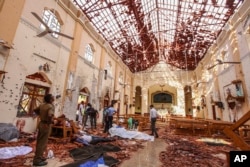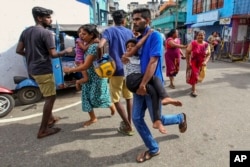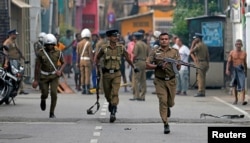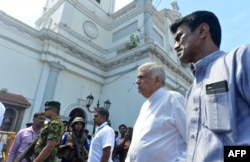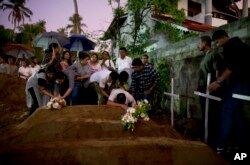VOA national security correspondent Jeff Seldin contributed to this report.
NEW DELHI, INDIA — Sri Lanka is imposing a state of emergency after blaming a little-known radical Islamist group for the series of devastating blasts that killed 300 people and injured hundreds of others on Easter Sunday.
A police spokesman said Tuesday 40 people have been taken into custody in connection with the massacre, which marks the deadliest violence to hit the South Asian island nation since their two-decade civil war ended in 2009. The spokesman also said the death toll has risen to 310.
The government said it is investigating whether the group had links to foreign terrorist organizations, even as Prime Minister Ranil Wickremesinghe confirmed the country had received prior warning of the attacks from a foreign intelligence agency.
The sophisticated planning behind the eight blasts, which targeted churches and hotels, shattered a decade-long calm in the island nation and unnerved investigators and officials.
"We do not believe these attacks were carried out by a group of people who were confined to this country," cabinet spokesman Rajitha Senaratne told reporters. "There must be a wider international network behind it."
President Maithripala Sirisena is expected to meet diplomats in Colombo on Tuesday to ask for help in tracing the possible links of the attackers to overseas militant groups.
U.S. officials said Monday those behind the Sri Lanka bombings may have been inspired by Islamic State, but cautioned that no final determination has been reached.
Officials said they believe seven suicide bombers belonging to the National Thowfeek Jamaath (NTJ) group carried out the coordinated attacks that ripped through four hotels and three prominent churches, claiming a heavy toll and leaving a nation in shock. Not much is known about NTJ, which came to the attention of authorities last year when the group's members were blamed for defacing some Buddhist statues.
Fear of more blasts gripped the country on Monday as 87 bomb detonators were found at Colombo's main bus station and an explosion in a van parked near one of the bombed churches sent passersby fleeing. The explosion occurred while police were defusing a bomb.
Streets in the capital were mostly deserted, and many businesses remained shuttered as a heavy police deployment continued in the country. Armed soldiers and bomb-sniffing dogs had replaced the tourists that usually crowd the beach facing the hotel district.
Six blasts that claimed the most victims took place Sunday when churches were crowded with Easter worshippers, and tourists and businessmen were having breakfast at the luxury hotels.
One of the suicide bombers had lined up for the breakfast buffet at a hotel restaurant, according to police. Two more blasts were reported in the afternoon.
The capital, Colombo, took the worst hit.
The White House said President Donald Trump called Sri Lanka Prime Minister Wickremesinghe to express his condolences over the blasts.
The nationwide emergency in Sri Lanka, effective at midnight, gives police wide powers to carry out searches and interrogate suspects. Authorities said 24 people have been arrested so far, but police have released no details about the detainees.
Police also said that they will investigate if warnings that suicide bombers had planned attacks on prominent churches, hotels and the Indian High Commission had been ignored.
Media reports in India said the warning had come from Indian intelligence agencies.
"We must look into why adequate precautions were not taken. Neither I nor the ministers were kept informed," Wickremesinghe said.
Sirisena and Wickremesinghe have been political rivals since the former attempted to replace him unsuccessfully four months ago, creating a divide in the government, according to political analysts.
The country was no stranger to bombings and violence during a 25-year civil war, but the end of the insurgency in 2009 had restored tranquility to the tropical island.
Cabinet spokesman Rajitha Senaratne said, "We are very, very sorry. As a government, we have to apologize to the families and the institutions about this incident."
Some investigators said the targets — hotels and churches — were likely chosen to gain maximum international attention.
While most of the victims were Sri Lankans, 39 foreigners were among those who died, according to the latest count. Those killed include celebrity Sri Lankan chef Shantha Mayadunne and her daughter, who posted a photo of the family having Easter breakfast just before the explosion.
The 1.5 million Christians in the mostly Buddhist country make up about 7% of the more than 21 million population.





